GDPR Email Marketing
Why Prioritize GDPR in Your Email Campaigns?
Safeguard your global operations and strengthen trust with subscribers by prioritizing GDPR in your email campaigns – discover how it can positively influence your engagement and strategy effectiveness.
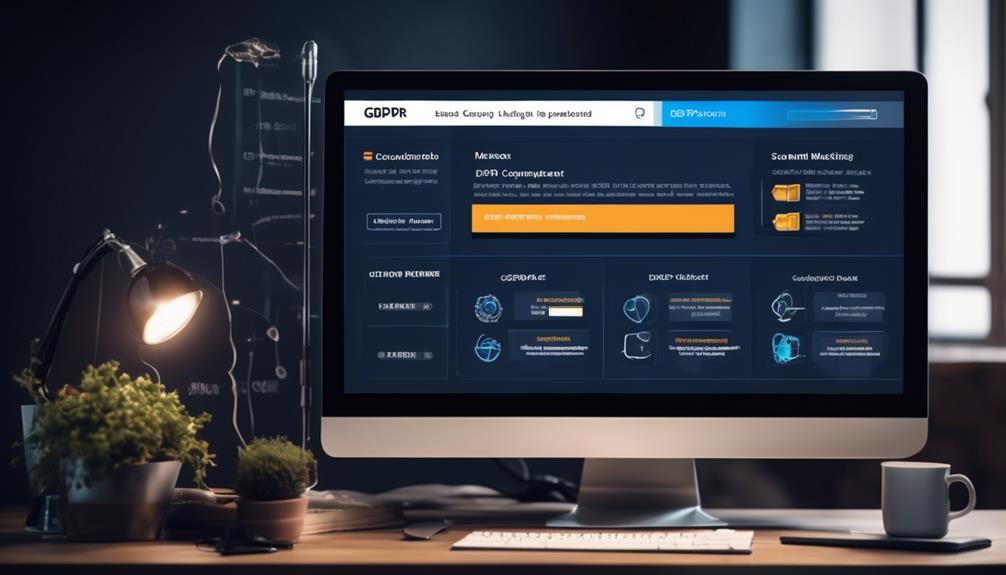
As enterprises, overlooking the importance of making GDPR a key focus in our email marketing efforts is something we simply cannot do. Adhering to GDPR standards not only protects our worldwide activities but also enhances the level of trust and openness we share with our subscriber base.
However, the impact of GDPR on our email marketing strategies goes beyond mere legal requirements. It's about fostering a culture of respect for data privacy and adapting to the evolving landscape of consumer expectations.
But there's more to understand about the practical implications of prioritizing GDPR in our email campaigns, and how it can positively influence our engagement with subscribers and the effectiveness of our strategies.
Key Takeaways
- GDPR compliance is essential for businesses handling EU citizen data, as well as those marketing to EU residents.
- Obtaining valid consent for email marketing is a fundamental requirement under GDPR.
- Robust data protection measures, such as encryption and pseudonymization, should be implemented to safeguard personal data.
- Prioritizing GDPR in email campaigns can lead to benefits such as increased trust, improved deliverability, and higher ROI.
Understanding GDPR for Email Marketing
Understanding GDPR for Email Marketing is crucial for businesses of all sizes and locations to ensure compliance with data privacy regulations. The General Data Protection Regulation (GDPR) is a comprehensive framework that impacts not only EU-based businesses but also those worldwide. It necessitates a meticulous approach to data collection, storage, and usage.
When it comes to email marketing, obtaining valid consent from individuals for data processing is a fundamental requirement under GDPR. This means that businesses must have a clear understanding of the conditions for lawful processing of personal data, including email addresses.
Additionally, it's imperative to be mindful of the territorial scope of GDPR, as it applies to businesses targeting individuals within the EU, irrespective of the businesses' physical location. Therefore, companies engaging in email marketing need to tailor their strategies to comply with GDPR, ensuring that their data collection and processing practices align with the regulation's stipulations.
Scope of GDPR for Email Campaigns

Now, let's focus on the scope of GDPR for email campaigns.
Understanding the basics of GDPR compliance is crucial, and email consent requirements are a key aspect to consider.
Additionally, implementing robust data protection measures is essential to align with GDPR standards.
GDPR Compliance Basics
GDPR compliance in email marketing is crucial for businesses worldwide that handle the personal data of EU citizens, regardless of their location. Understanding the basics of GDPR compliance is essential for all businesses engaging in email marketing. Here are some key points to consider:
- GDPR's territorial scope extends to businesses worldwide that handle EU citizen data, requiring compliance regardless of location.
- This means that even businesses outside the EU must adhere to GDPR if they market to EU residents or monitor their behavior.
Ensuring GDPR compliance involves obtaining freely given, specific, informed, and unambiguous consent for email marketing. It also mandates the need for a valid legal basis for processing personal data and clear communication of data handling practices, aligning with GDPR's data protection and privacy policy principles.
Email Consent Requirements
When obtaining consent for email marketing under GDPR, businesses must ensure that the consent is freely given, specific, informed, and unambiguous. It's crucial to clearly outline the purposes for which the data will be processed, including for email marketing campaigns.
Consent and data collection methods should be designed to ensure GDPR compliance, with a focus on transparency and clarity. Businesses should also implement mechanisms for individuals to easily withdraw their consent at any time.
Additionally, it's important to keep records demonstrating that valid consent has been obtained for the collection and use of personal data for email marketing.
Adhering to these email consent requirements is essential for businesses to maintain compliance with GDPR while conducting their email marketing campaigns.
Data Protection Measures
In aligning with the stringent email consent requirements stipulated by GDPR, businesses must now shift their focus to establishing robust data protection measures within the scope of their email campaigns.
When it comes to data protection in email marketing under GDPR, there are key measures to consider:
- Implement encryption and pseudonymization techniques to safeguard personal data.
- Utilize secure email platforms and encryption protocols to protect sensitive information.
- Regularly conduct data protection impact assessments to identify and mitigate potential risks in email marketing activities.
These measures are essential for ensuring compliance with GDPR's data protection principles and safeguarding the personal data processed within email campaigns.
Pillars of GDPR in Email Marketing

Let's focus on the key pillars of GDPR in email marketing:
- Consent requirements: Ensuring that consent is obtained in a clear and affirmative manner is crucial for email marketing strategies. By obtaining consent from recipients before sending them marketing emails, businesses can respect their privacy and avoid potential penalties.
- Data protection principles: Adhering to data protection principles is essential for maintaining the security and integrity of personal data collected through email marketing. This includes implementing appropriate security measures, such as encryption and access controls, and regularly reviewing and updating data protection practices.
- Compliance with regulations: Staying compliant with GDPR regulations is a fundamental aspect of email marketing. Businesses need to understand the requirements imposed by GDPR and ensure that their email marketing practices align with these regulations. This includes providing individuals with the right to access, rectify, and delete their personal data, as well as the obligation to report data breaches.
By prioritizing these pillars, businesses can:
- Establish trust: By obtaining consent and protecting personal data, businesses can establish trust with their subscribers. This can lead to higher engagement rates, increased customer loyalty, and improved brand reputation.
- Enhance data security: Adhering to data protection principles helps businesses enhance the security of personal data collected through email marketing. This reduces the risk of unauthorized access, data breaches, and potential legal consequences.
- Maintain transparency: By complying with GDPR regulations, businesses can maintain transparency in their email campaigns. This includes providing clear and concise privacy notices, informing recipients about their rights, and giving them control over their personal data.
Consent Requirements
To comply with GDPR regulations, email marketers must ensure that they've obtained explicit and informed consent from individuals before sending them marketing communications. This means that the consent must be freely given, specific, informed, and unambiguous.
To meet the consent requirements under GDPR for email marketing campaigns, consider the following:
- Clearly explain the purpose: Provide individuals with clear and specific information about the purposes of the data processing for which they're giving consent.
- Use simple language: Avoid using complex legal jargon and ensure that the consent request is easy to understand for the average person.
Data Protection Principles
After ensuring explicit and informed consent for email marketing campaigns, the next crucial aspect is understanding and implementing the data protection principles, which serve as the pillars of GDPR compliance in email marketing.
GDPR mandates that the processing of personal data must be lawful, fair, and transparent, guiding the data handling practices of any email marketing strategy. Businesses must have a valid legal basis for processing personal data in a clear and understandable way, aligning with GDPR's core principles including lawfulness, fairness, and transparency.
Additionally, GDPR provides individuals with greater control over their personal data through rights such as access, rectification, erasure, and the right to object to processing, which email marketers must align with in their campaigns.
Implementing GDPR principles into email campaigns, such as data minimization and providing clear and accessible unsubscribe options, shows respect for subscribers and their data.
GDPR compliance is necessary for both multinational corporations and small/medium-sized enterprises using email marketing, as it changes the relationship between businesses and subscribers, requiring freely given, specific, informed, and unambiguous consent for email marketing.
Compliance With Regulations
Complying with regulations is a foundational aspect of GDPR in email marketing, shaping the framework for lawful, fair, and transparent processing of personal data.
When ensuring compliance with GDPR in email campaigns, we focus on:
- Legal Basis: We must have a valid legal basis for processing personal data and adhere to GDPR's core principles. This involves obtaining consent, fulfilling contracts, complying with legal obligations, protecting vital interests, performing tasks in the public interest, and pursuing legitimate interests while respecting individuals' rights.
- Individual Rights: GDPR provides individuals with greater control over their personal data through rights such as access, rectification, erasure, and the right to object to processing. Upholding these rights is crucial for maintaining compliance with GDPR in email marketing.
Relevance of GDPR to Email Marketers

Understanding the impact of GDPR on email marketing is crucial for compliance and successful campaign management. As email marketers, we must prioritize GDPR as it significantly impacts how we collect, store, and process personal data for our marketing strategies and email campaigns.
| Key Aspect | Description |
|---|---|
| Consent | Obtaining explicit consent for processing personal data is a fundamental requirement under GDPR. |
| Data Protection | GDPR mandates the implementation of robust data protection measures to safeguard individuals' personal data. |
| Transparency | Email marketers must provide clear and transparent information to individuals about how their personal data will be used. |
| Accountability | It is essential for email marketers to demonstrate accountability by maintaining detailed records of data processing activities. |
| Compliance Checks | Regular compliance checks and audits are necessary to ensure that email marketing practices align with GDPR requirements. |
Crafting a GDPR-Compliant Email Strategy

When crafting a GDPR-compliant email strategy, consent management and data protection provisions are key points to consider.
Ensuring that subscribers have given clear and explicit consent for their data to be used is a fundamental aspect of compliance.
Implementing data protection measures in line with GDPR principles not only keeps email campaigns lawful, but also builds trust and respect with subscribers.
Consent Management
Crafting a GDPR-compliant email strategy requires meticulous attention to consent management, ensuring that subscribers' consent is freely given, specific, informed, and unambiguous. When addressing consent management in email marketing, it's essential to adhere to GDPR guidelines and best practices. Here are some key considerations:
- Clear Opt-In Process:
- Provide a clear and easily accessible opt-in process for subscribers to give explicit consent.
- Clearly outline what they're consenting to, such as receiving promotional emails or newsletters.
- Granular Preference Options:
- Offer granular preference options, allowing subscribers to choose the type and frequency of emails they receive.
- Empower subscribers to easily update their preferences or withdraw consent at any time.
Data Protection Provisions
Upon addressing consent management in email marketing, businesses must pivot to implementing robust data protection provisions to ensure a GDPR-compliant strategy. Protecting personal data and ensuring data subject rights are crucial elements of GDPR compliance in email marketing. The table below outlines key data protection provisions that businesses need to incorporate into their email campaigns to uphold GDPR principles and respect subscribers' personal data.
| Data Protection Provisions | Description |
|---|---|
| Lawfulness | Ensure that the processing of personal data is lawful and transparent. |
| Fairness | Treat subscribers' personal data fairly and with respect for their rights. |
| Purpose Limitation | Collect and process personal data for specified, legitimate purposes. |
| Data Minimization | Limit the collection and storage of personal data to what is necessary for the intended purpose. |
Incorporating these provisions into email marketing practices not only ensures GDPR compliance but also fosters trust and credibility with subscribers.
Implementing GDPR in Email Campaigns
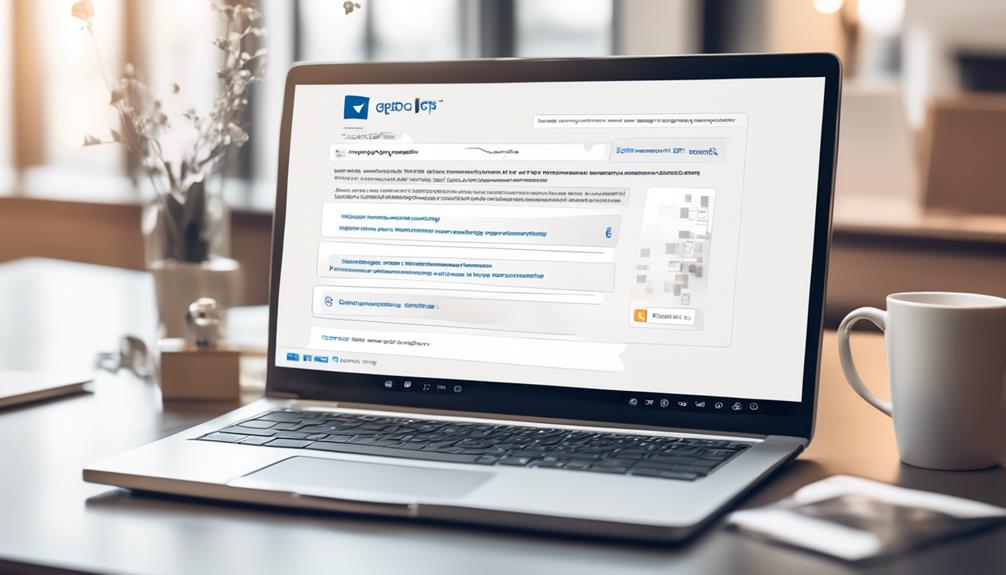
Implementing GDPR principles in email campaigns ensures the lawful, fair, and transparent processing of personal data, prioritizing subscribers' rights and compliance with regulations.
When we implement GDPR in our email marketing campaigns, we show respect for the privacy and data protection rights of EU citizens. To achieve this, we need to focus on clear consent and data minimization.
By obtaining explicit consent from subscribers before sending them marketing emails, we demonstrate our commitment to respecting their personal data.
Additionally, practicing data minimization ensures that we only collect and process the information necessary for the specific purpose of our marketing campaigns.
Moreover, offering accessible unsubscribe options empowers subscribers to manage their preferences easily, aligning with GDPR's emphasis on individuals' control over their data.
Thus, by implementing GDPR in our email campaigns, we not only comply with regulations but also build trust with our subscribers and demonstrate our commitment to responsible data management.
Managing Subscriber Data Responsibly

As marketers, we understand the importance of managing subscriber data responsibly.
It involves implementing robust data security measures and ensuring compliance with data protection regulations like GDPR.
Data Security Measures
To ensure compliance with GDPR regulations, we prioritize implementing robust data security measures to responsibly manage subscriber data in our email campaigns. This involves encrypting all personal data stored in our systems and regularly updating our security protocols to protect against potential breaches.
Our approach to data security includes:
- Regular security audits and penetration testing to identify and address vulnerabilities proactively. This ensures that our systems remain resilient against evolving cyber threats and align with GDPR's data protection requirements.
- Training our staff on data security best practices and the proper handling of personal data. By equipping our team with the necessary knowledge and skills, we ensure that all aspects of our email marketing strategies are GDPR compliant and uphold the highest standards of data security.
Compliance With Regulations
When managing subscriber data responsibly, we prioritize compliance with regulations to ensure that our email campaigns align with GDPR requirements and uphold the highest standards of data protection.
GDPR, the data protection regulation of the European Union (EU), sets strict guidelines for the collection, processing, and storage of personal data.
In our email marketing efforts, we're committed to complying with these regulations by obtaining explicit consent from subscribers, providing easily accessible opt-out options, and safeguarding personal data with robust security measures.
Our dedication to compliance not only protects the privacy of our subscribers but also enhances the trust and credibility of our brand.
Data Protection and Security Measures

Incorporating a double-check system for email list sign-ups is essential to ensure permission and enhance security. Utilize real-time email verification and a CDN provider to further strengthen data protection measures. Implementing an SSL certificate for a secure HTTPS website URL is crucial to ensure secure data transmission and storage.
Additionally, offering visitors options to accept, reject, or customize cookies, and including a cookie banner, is essential to comply with GDPR regulations and protect personal data.
- Utilize real-time email verification and a CDN provider
- Enhance security and data protection measures
- Ensure the authenticity of email list sign-ups
Partnering With a Gdpr-Compliant ESP

Partnering with a GDPR-compliant Email Service Provider (ESP) is essential for ensuring compliance with data protection regulations and obtaining explicit consent for email marketing. When selecting an ESP, it's crucial to verify their GDPR compliance to align with the stringent data protection requirements.
By partnering with a GDPR-compliant ESP, businesses can streamline the process of obtaining and managing explicit consent for email marketing campaigns. This not only helps in adhering to GDPR regulations but also demonstrates a commitment to data privacy and ethical marketing practices.
A GDPR-compliant ESP can also assist in maintaining data accuracy, providing easy unsubscribe options, and respecting subscriber rights, which are all integral components of GDPR compliance. Moreover, choosing a GDPR-compliant ESP can significantly enhance the effectiveness of email campaigns. It not only ensures legal compliance but also helps in optimizing marketing strategies and maintaining the trust of the audience.
Therefore, partnering with a GDPR-compliant ESP is crucial for businesses aiming to prioritize GDPR in their email marketing endeavors.
Educating Your Team on GDPR

To ensure GDPR compliance in our email marketing efforts, it's imperative to thoroughly educate our team on the far-reaching impact and fundamental principles of the GDPR. This involves:
- Understanding the territorial scope of GDPR and its implications for businesses worldwide, especially those handling the personal data of EU citizens.
- Emphasizing the need for GDPR compliance for multinational corporations and small/medium-sized enterprises engaged in email marketing.
- Stressing the importance of obtaining freely given, specific, informed, and unambiguous consent for email marketing from subscribers.
Grasping the core principles of GDPR, such as lawfulness, fairness, transparency, purpose limitation, data minimization, accuracy, storage limitation, integrity, confidentiality, and accountability. This knowledge guides data handling practices in email marketing, ensuring compliance with GDPR's data protection requirements.
Educating our team on these aspects will enable them to align our marketing strategy with GDPR principles, manage subscriber data responsibly, and understand the significance of consent withdrawal.
This comprehensive understanding is crucial for implementing GDPR-compliant email marketing practices and safeguarding the privacy rights of our subscribers.
Continuous Improvement and Compliance Monitoring
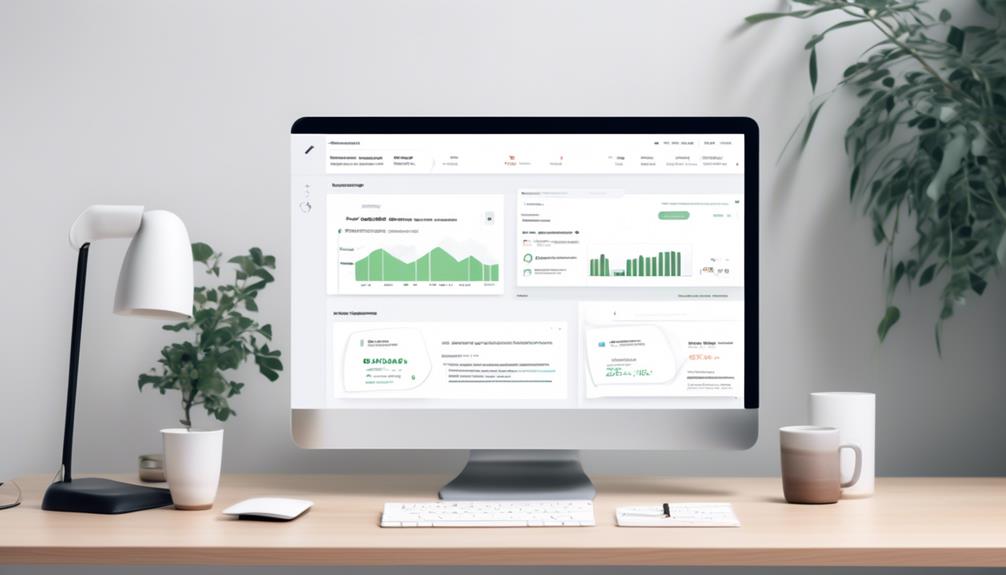
Continuous improvement in GDPR compliance requires regular review and updating of data practices to align with evolving regulations and best practices. In the context of email marketing, this involves actively monitoring and assessing data collection, storage, and processing activities to ensure alignment with GDPR requirements. Implementing a robust system for compliance monitoring is essential for identifying and addressing areas of non-compliance. Regular audits and assessments play a crucial role in evaluating and improving data handling practices, ultimately contributing to enhanced data protection and adherence to consent withdrawal requests.
Maintaining comprehensive documentation of compliance efforts is vital for demonstrating ongoing commitment to GDPR requirements and facilitating transparency with regulatory authorities. It also enables organizations to incorporate feedback and insights from compliance monitoring activities into the continuous improvement process. By leveraging these insights, businesses can enhance the effectiveness of their GDPR compliance measures in email marketing campaigns.
This iterative approach not only fosters better compliance but also helps in staying abreast of evolving regulatory standards and best practices, ultimately contributing to a more robust and trustworthy email marketing strategy.
Future Outlook of GDPR and Email Marketing
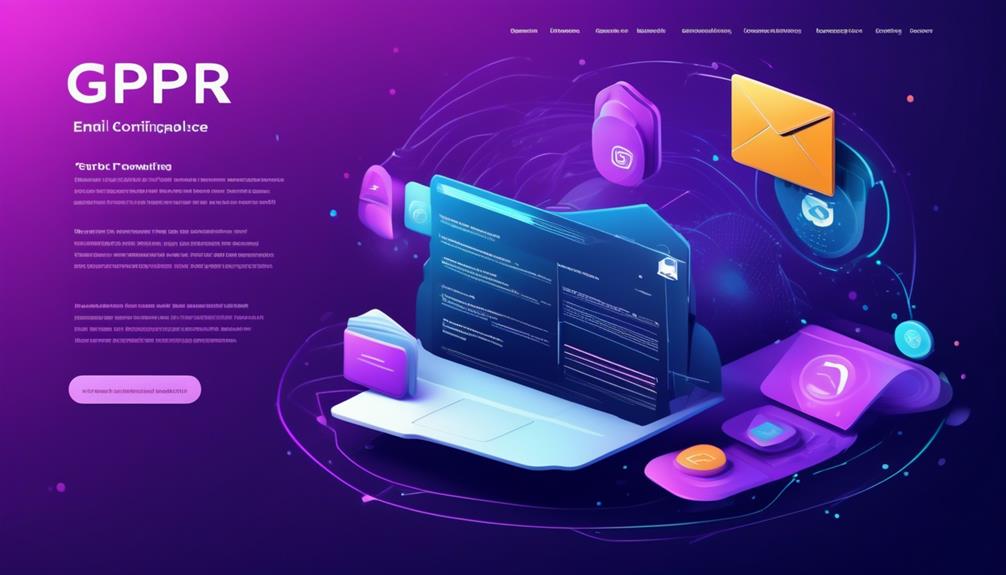
Looking ahead, we anticipate that GDPR will continue to significantly impact the landscape of email marketing, requiring businesses to adapt and refine their strategies to ensure ongoing compliance and consumer trust. As the future of GDPR and email marketing unfolds, here are a couple of key points to consider:
- Enhanced Data Protection Measures
- GDPR will likely push for even more stringent measures to protect personal data in email marketing, necessitating advanced encryption and security protocols to safeguard customer information.
- Businesses will need to invest in robust data protection technologies and stay updated with GDPR guidelines to maintain the integrity and security of personal data in their marketing efforts.
- Balancing Personalization and Compliance
- The future of GDPR in email marketing will prompt a delicate balance between delivering personalized content and respecting data protection regulations.
- Marketers will need to explore innovative ways to tailor their email campaigns while ensuring strict compliance with GDPR, possibly leading to the development of new marketing strategies that prioritize both personalization and data protection.
Adapting to these anticipated shifts will be crucial for businesses aiming to stay ahead in the evolving landscape of email marketing under GDPR.
Anticipating Future GDPR Enhancements
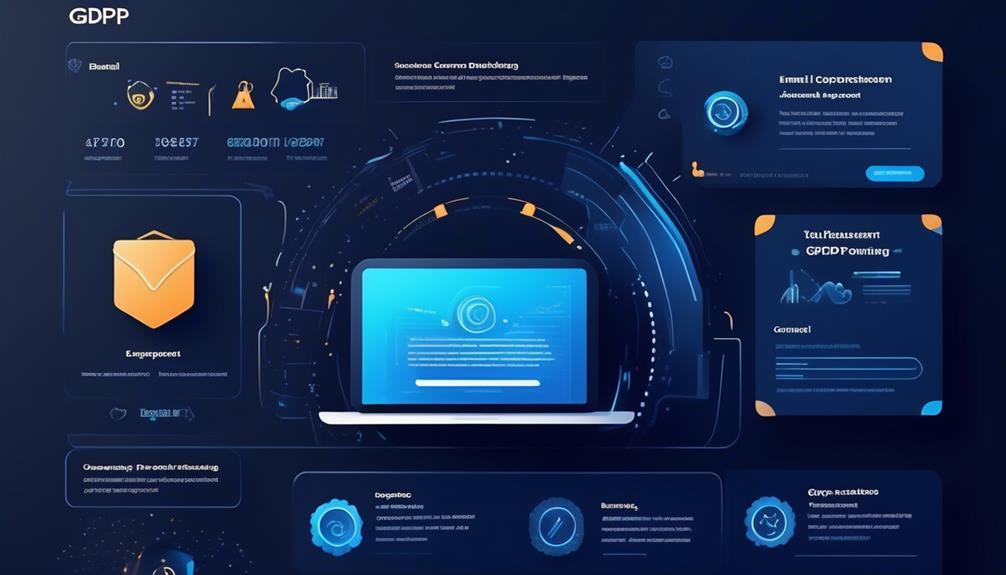
Anticipating potential GDPR enhancements is crucial for proactively aligning our email marketing strategies with evolving data protection standards. As GDPR regulations continue to evolve, it's essential to anticipate future changes that may impact email marketing practices. This proactive approach allows businesses to stay ahead of regulatory updates, ensuring ongoing compliance and maintaining transparent, trustworthy relationships with their audience.
By staying informed about potential future GDPR updates, businesses can adapt their email marketing strategies to align with upcoming changes in privacy regulations. This anticipation also aids in developing long-term data retention practices, ensuring that email marketing efforts comply with future GDPR enhancements.
Additionally, anticipating changes to GDPR can assist in integrating marketing automation processes that prioritize data privacy and consent management.
Leveraging GDPR for Better Engagement
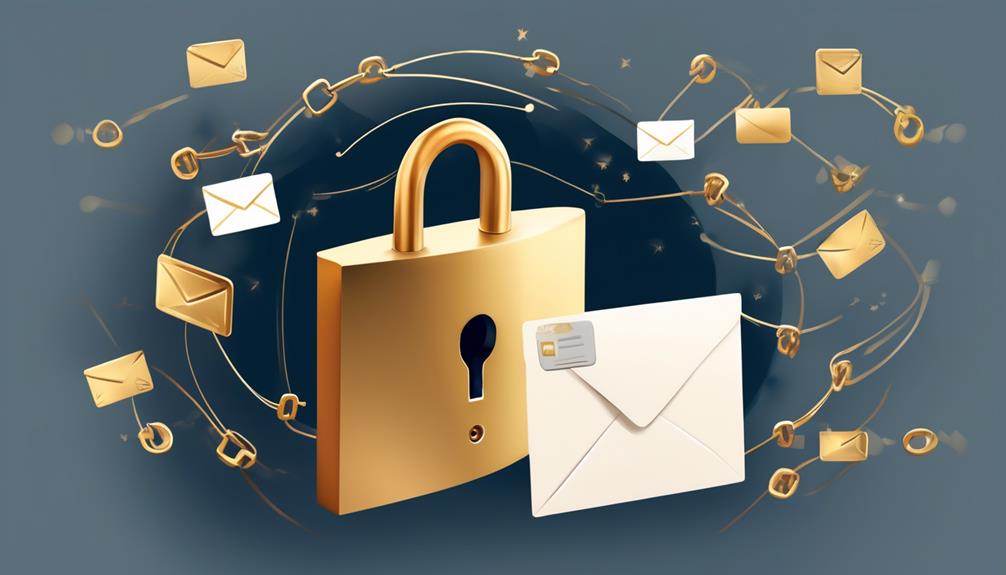
To enhance engagement with email marketing campaigns, leveraging GDPR principles is crucial for maintaining compliance and respecting subscribers' data privacy. By incorporating GDPR into our email marketing strategies, we can ensure that our marketing efforts align with the principles of lawfulness, fairness, transparency, and accountability.
This not only demonstrates our commitment to data protection but also builds trust with our subscribers, leading to better engagement and more effective email campaigns.
Here's how we can leverage GDPR for better engagement:
- Obtaining explicit consent: Requesting clear and unambiguous consent from subscribers not only ensures GDPR compliance but also indicates a genuine interest in engaging with our content.
- Providing transparent opt-in processes: Clearly outlining the purpose and frequency of communication when obtaining consent can help set appropriate expectations and foster positive engagement with our email campaigns.
Innovation Within Compliance Boundaries

How can email marketers innovate within compliance boundaries to create effective and personalized email campaigns while adhering to GDPR regulations?
Innovation within compliance boundaries is essential for email marketers to thrive in the era of GDPR. By embracing GDPR principles, email marketers can design innovative and personalized campaigns that respect data protection regulations.
This can be achieved by implementing creative approaches to data collection and management while ensuring compliance with GDPR standards. Leveraging GDPR-compliant strategies fosters innovation in engaging subscribers and respecting their data rights. It encourages email marketers to think outside the box and develop innovative solutions to deliver targeted and impactful campaigns.
Frequently Asked Questions
How Does GDPR Affect Email Marketing?
GDPR affects email marketing by mandating lawful, fair, and transparent processing of personal data. It requires obtaining consent before sending emails, with stricter rules for opt-in permission.
Non-compliance can result in fines up to 4% of global revenue or €20 million. Therefore, prioritizing GDPR in email campaigns is crucial for ensuring compliance and avoiding hefty penalties.
Why Is GDPR Important in Marketing?
GDPR is crucial in marketing because it ensures ethical handling of personal data, fostering trust and accountability. By prioritizing GDPR, we uphold subscribers' rights, boost campaign effectiveness, and mitigate legal risks.
It aligns with the adage 'honesty is the best policy.' Our compliance demonstrates respect for individuals' data, aligns with global best practices, and positions our business as trustworthy and credible.
It's a fundamental aspect of responsible marketing, safeguarding both subscribers and our organization.
Why Is It Important to Follow Gdpr?
It's important to follow GDPR because it ensures that we handle data responsibly and with respect for individuals' privacy.
By complying with GDPR, we build trust with our subscribers and demonstrate our commitment to transparency and accountability in our email marketing practices.
Additionally, following GDPR principles helps us avoid potential legal and financial consequences.
What Practice Should an Email Campaign Follow to Comply With Gdpr?
To comply with GDPR, an email campaign should follow strict opt-in procedures. This means that individuals must give their explicit consent to receive marketing emails from us. We should provide clear consent language that explains what their information will be used for and how they can opt out.
Additionally, our email campaigns should offer easily accessible unsubscribe options. This allows recipients to easily and quickly stop receiving our emails if they no longer wish to do so.
In order to comply with GDPR, we must also regularly update and maintain accurate recipient data. This includes removing any inactive or outdated email addresses from our mailing list.
Furthermore, we need to securely store and process personal information. This means implementing appropriate security measures to protect the data from unauthorized access or disclosure.
Finally, we should be transparent about our data practices. This includes providing individuals with information about how their data is collected, used, and stored.
Prioritizing GDPR compliance is not only important for protecting individuals' rights, but it also helps to build trust and credibility with our audience.
Is GDPR Compliance Essential for Email Marketing Success?
GDPR and email marketing go hand in hand for success. Ensuring GDPR compliance is essential for maintaining trust with subscribers and avoiding hefty penalties. By respecting privacy and obtaining proper consent, businesses can create more effective and ethical email marketing campaigns.
Conclusion
In conclusion, prioritizing GDPR in our email campaigns is essential for building trust and respect with our subscribers.
Did you know that 67% of consumers are more likely to engage with brands that prioritize data privacy and protection?
By aligning our email marketing strategy with GDPR principles, we can't only comply with regulations but also improve engagement and trust with our audience.
Let's continue to innovate within compliance boundaries for a more effective and respectful email marketing approach.
Natali – Editor in Chief (Strategy and Mastery, AI Expert) Natali, our Editor in Chief, is the driving force behind our content’s strategic direction. With a keen eye for detail and a deep understanding of market trends, Natali ensures that our content is top-notch and strategically aligned with our client’s goals. Her expertise in AI helps to seamlessly integrate advanced technology into our marketing strategies, pushing the boundaries of conventional marketing.
GDPR Email Marketing
7 Best GDPR Compliance Tips for Email Marketers
Tread carefully through the complexities of GDPR compliance with these seven essential tips for email marketers, ensuring your campaigns are legally sound and effective.

As email marketing professionals, we navigate the delicate balance of engaging our audience while protecting their privacy. In the current digital environment, with tightening data protection laws, it’s essential to find a middle ground that respects our subscribers’ rights while effectively reaching out to them.
As we navigate the complexities of GDPR compliance, there are seven key tips that can significantly impact our email marketing strategies and ensure that we stay on the right side of the law. These tips not only address the legal requirements but also contribute to more targeted and effective campaigns, reduced risk of fines and penalties, improved data security and privacy practices, and a strengthened brand reputation.
Key Takeaways
- Explicit consent is mandatory for processing personal data for email marketing under GDPR.
- Implement robust consent management systems to track and record consent.
- Regularly review and update consent agreements.
- Maintain comprehensive and secure records of consent.
Consent Requirements
Ensuring compliance with GDPR consent requirements for email marketing is crucial for maintaining data privacy and avoiding legal issues. Under the GDPR, obtaining explicit consent is mandatory for processing personal data for email marketing. This means that individuals must freely, specifically, and unambiguously consent to their data being used for marketing purposes.
To manage consent effectively, email marketers should implement robust consent management systems to track and record consent from subscribers. Additionally, the opt-in method should be used, and proof of consent must be retained to demonstrate compliance. Legacy contacts also require repermissioning to ensure that their consent meets GDPR standards.
Every marketing communication should include a clear and easy-to-access unsubscribe link, allowing individuals to opt-out at any time. It's essential to regularly remind subscribers of their right to withdraw consent and provide them with easy mechanisms to do so.
Data Minimization Practices
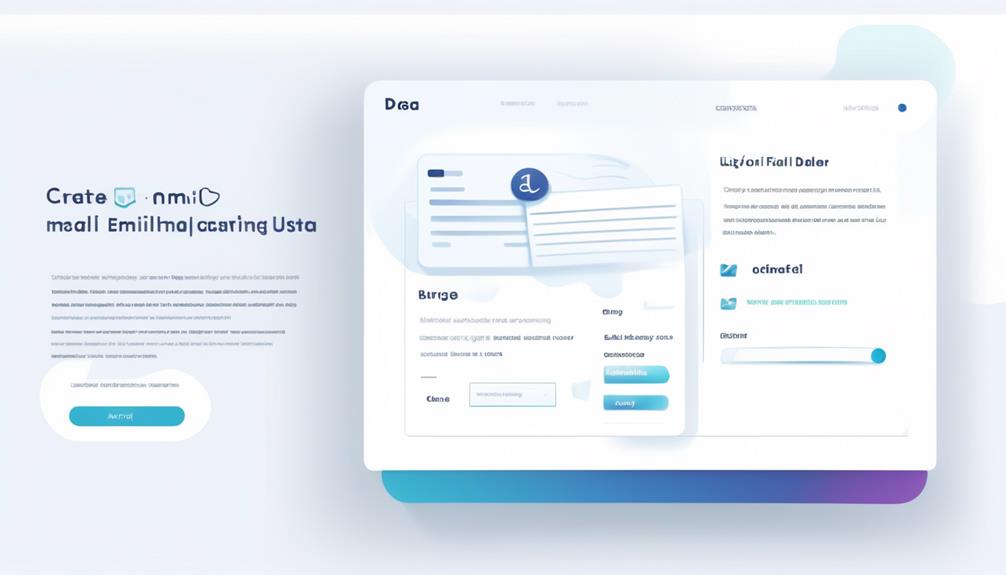
As email marketers, we must prioritize limiting the data we collect, securing the storage of that data, and regularly reviewing the information we have.
By only gathering the necessary personal data and regularly reassessing what we store, we can reduce the risk of privacy violations and data breaches.
Implementing clear processes for data deletion and obtaining explicit consent for each purpose will further ensure GDPR compliance.
Limit Data Collection
To comply with data minimization practices, email marketers should collect and retain only the necessary data for email marketing purposes and ensure clear and specific consent processes for data collection. This approach aligns with GDPR requirements and demonstrates a commitment to privacy and data protection. When limiting data collection, consider the following:
- Clear Communication: Inform individuals about the purpose and duration of data collection for email marketing, ensuring transparency and compliance with privacy regulations.
- Regular Consent Review: Review and update consent agreements regularly to adhere to data minimization principles and maintain compliance with GDPR.
- Accessible Withdrawal Options: Provide individuals with accessible options to withdraw their consent for email marketing data collection, respecting their right to privacy.
- Security Measures: Implement robust security measures to safeguard the processed personal data, maintaining its confidentiality and integrity.
Secure Data Storage
When it comes to email marketing, securely storing only the essential personal data is crucial to align with data minimization practices and maintain GDPR compliance. It's vital to evaluate and minimize the amount of personal data collected and stored, ensuring it aligns with the GDPR's data minimization principle. Regularly reviewing and updating data storage practices is essential to ensure compliance with GDPR requirements. Employing pseudonymization and encryption techniques can reduce the amount of personally identifiable information stored, in line with GDPR's data minimization principles. Here's a table highlighting key points for secure data storage in email marketing:
| Key Points | Description |
|---|---|
| Minimize Data Collection | Evaluate and minimize the amount of personal data collected and stored. |
| Pseudonymization | Consider employing pseudonymization techniques to reduce personally identifiable information. |
| Encryption Techniques | Use encryption to secure stored personal data in compliance with GDPR. |
Implementing these practices ensures secure data storage, aligns with GDPR requirements, and protects personal data privacy.
Regular Data Review
Regularly reviewing and minimizing the personal data collected is essential to ensure compliance with data minimization practices under GDPR. When it comes to email marketing, data review is crucial for maintaining GDPR compliance and respecting privacy rights of EU citizens.
Here's how to effectively implement data minimization practices:
- Conduct periodic audits to ensure only necessary personal data is collected and processed.
- Implement processes to clean and update mailing lists regularly, removing unnecessary or outdated personal data.
- Document and maintain records of specific purposes for using personal data in email marketing.
- Establish clear consent mechanisms for individuals to opt-out and manage their data in line with GDPR's data minimization principles.
Obtaining Explicit Consent
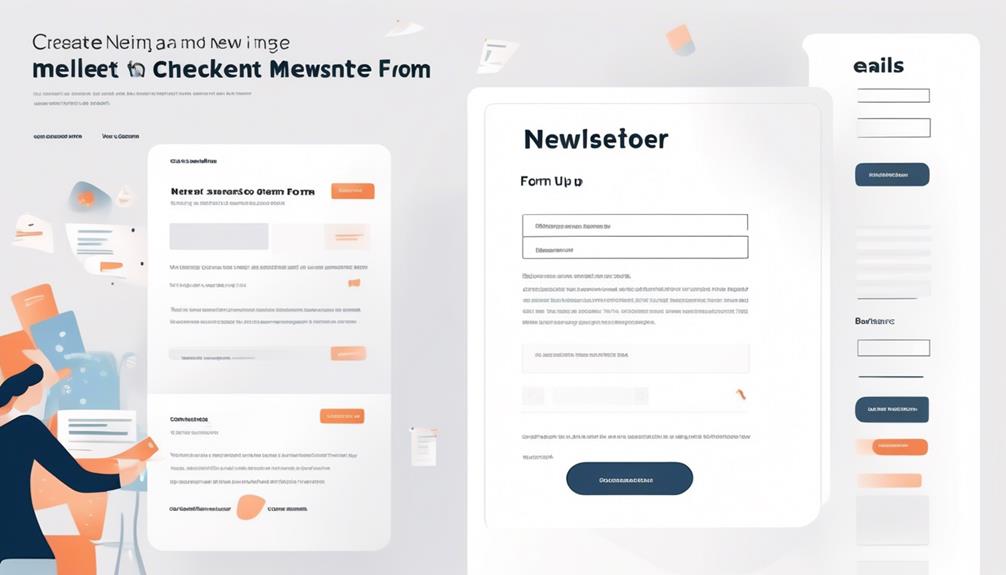
We clearly communicate the purpose of data collection and obtain explicit consent for email marketing to ensure GDPR compliance. Obtaining explicit consent from subscribers is crucial, as individuals have the right to confirm their consent before receiving marketing emails. To achieve this, we implement a double opt-in process, where individuals actively confirm their consent. This ensures that the consent obtained is valid and unambiguous. Additionally, we separate consent requests from terms and conditions, making the consent specific, informed, and clear. This practice not only aligns with GDPR compliance but also builds trust with subscribers. Moreover, providing easy opt-out options in every marketing communication and promptly honoring withdrawal of consent is essential. To maintain GDPR compliance in email marketing, we regularly review and update consent agreements. This ensures that our practices remain in line with the evolving regulatory requirements and demonstrates our commitment to respecting the privacy and preferences of our subscribers.
| Obtaining Explicit Consent Strategies | Benefits |
|---|---|
| Double opt-in process | Valid and unambiguous consent |
| Separate consent requests | Specific, informed, and clear consent |
| Easy opt-out options in every communication | Respect subscriber choices |
| Regular review and update of consent agreements | Compliance with evolving regulations |
| Clear communication of data collection purpose | Build trust and transparency |
Secure Data Handling

Having obtained explicit consent for email marketing in accordance with GDPR regulations, our focus shifts to ensuring secure handling of personal data through robust encryption and access controls. To effectively handle personal data and maintain GDPR compliance, we must:
- Implement Encryption and Access Controls: Utilize encryption methods and strict access controls to safeguard personal data from unauthorized access or breaches.
- Establish Clear Procedures and Regular Audits: Develop clear procedures for data handling and conduct regular audits to ensure compliance with GDPR regulations and maintain the accuracy and relevance of our mailing lists.
- Provide Easy Opt-Out Options: Include clear and easy opt-out options in every marketing email, ensuring that the process is free-of-charge and straightforward for recipients.
- Train Employees and Establish Data Breach Response Plans: Educate employees on data protection practices and establish comprehensive data breach response plans to effectively address and mitigate any potential breaches, thereby upholding GDPR compliance in data handling.
GDPR-Compliant Email Practices
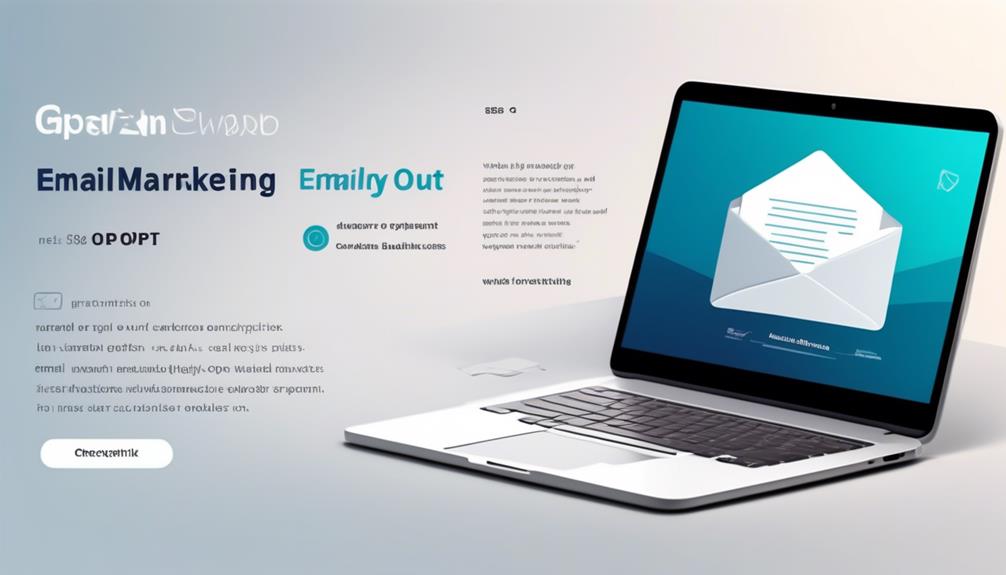
When ensuring GDPR compliance in email marketing, it's essential to obtain explicit consent from individuals before sending any marketing communications. Clearly stating the lawful purpose for collecting and using personal data in email marketing is crucial for compliance. Implementing a double opt-in process for subscribers to confirm consent adds transparency to your practices. Furthermore, providing easy and clear opt-out mechanisms in every marketing email is necessary to respect individuals' privacy rights.
Regularly auditing and cleaning mailing lists is essential to maintain GDPR compliance and build trust with customers. It ensures that data retention is in line with GDPR requirements and that only individuals who've given explicit consent receive marketing communications.
As email marketers, it's our responsibility to prioritize the security and privacy of EU citizens' data. By following these GDPR-compliant email practices, we demonstrate our commitment to data protection and build credibility with our audience. Compliance with GDPR not only safeguards individuals' privacy but also enhances the reputation and trustworthiness of our marketing efforts.
Double Opt-In Implementation
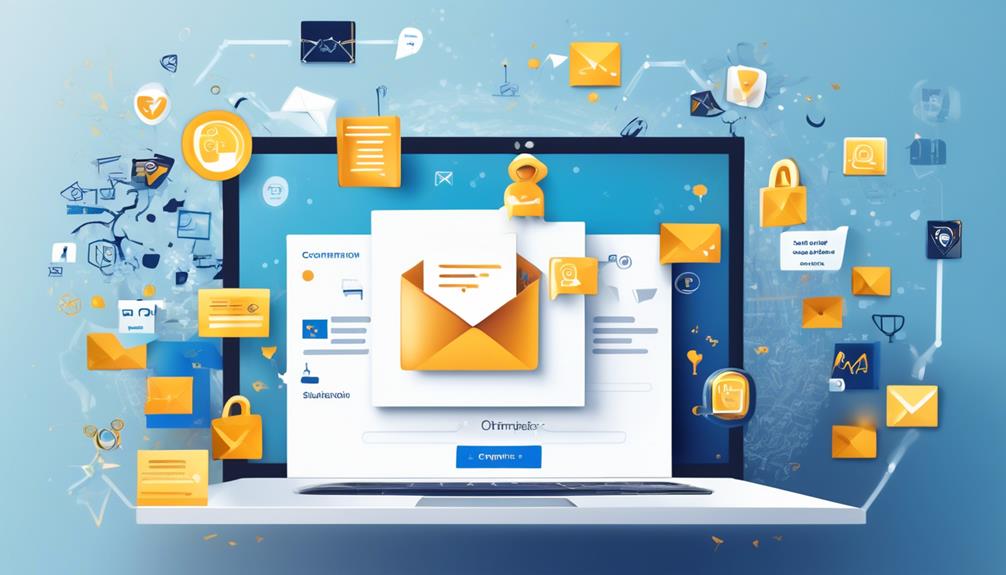
Transitioning from GDPR-compliant email practices, the implementation of Double Opt-In is a critical step for email marketers to enhance consent verification and reduce the risk of unauthorized sign-ups. Double Opt-In requires individuals to confirm their subscription twice, ensuring that they genuinely intend to subscribe and understand what they're signing up for.
Here's why it's crucial:
- Reduced Risk: By requiring a second confirmation, the risk of unauthorized sign-ups is significantly reduced.
- Consent Verification: Double Opt-In provides a clear audit trail of consent, essential for demonstrating GDPR compliance.
- Quality Improvement: Implementing Double Opt-In can enhance the quality of your email list, ensuring that your subscribers are genuinely interested in your content.
- Engagement Boost: It helps improve engagement levels as subscribers who've confirmed twice are more likely to be genuinely interested in your emails.
In the context of GDPR and data protection, Double Opt-In is an effective method for ensuring compliance with the regulation's consent and data retention requirements, ultimately protecting the personal data of EU data subjects.
Record-Keeping for Compliance

Maintaining meticulous records of consent is essential for demonstrating compliance with GDPR requirements for email marketing. As email marketers, we understand the significance of record-keeping in ensuring adherence to data protection regulations.
It's imperative to document the specific lawful basis for processing subscriber data for email marketing and to keep a record of how consent was obtained. This includes details of the opt-in method used, proof of consent, and any subsequent opt-out requests.
Regularly reviewing and updating these consent records is crucial to reflect any changes or withdrawals made by individuals, thereby ensuring that the stored information remains accurate and up to date.
Furthermore, it's essential to implement a robust system for capturing and securely storing consent information. This not only fulfills record-keeping obligations but also demonstrates a commitment to the security and privacy of subscriber data.
Clear and distinct consent from individuals for the processing of their personal data for email marketing purposes is a fundamental aspect of compliance. By maintaining comprehensive and secure records of consent, we can confidently comply with GDPR requirements and build trust with our subscribers.
Frequently Asked Questions
How Do I Comply With GDPR Email Marketing?
We comply with GDPR email marketing by obtaining clear consent, offering an easy opt-out, and ensuring all data collection is transparent.
It's crucial to interpret and follow GDPR rules carefully, providing proof of consent and keeping opt-out methods simple and free-of-charge.
Our compliance hinges on adhering to specific consent requirements and implementing opt-in processes.
It's imperative to understand and follow all GDPR regulations to ensure our email marketing practices are compliant.
What Is the GDPR Fine for Email Marketing?
The GDPR fine for email marketing can be substantial if organizations fail to comply with the strict regulations. It's crucial for email marketers to obtain clear consent from recipients and provide opt-out options.
Non-compliance may result in hefty penalties, as demonstrated by the €9 million fine imposed on Austrian Post.
Adhering to GDPR guidelines is essential for protecting both the organization and the privacy rights of individuals.
What Are the 7 GDPR Requirements?
We ensure GDPR compliance by meeting seven key requirements.
These include obtaining clear consent for data collection and email marketing, providing opt-out options, and maintaining proof of consent.
Our approach focuses on building trust with customers and engaging them while upholding legal standards.
These measures allow us to capture consent effectively and meet GDPR obligations.
What Are the GDPR Rules for Sending Emails?
We ensure GDPR compliance when sending emails by obtaining clear consent and providing opt-out options in every communication. Personal data is collected with explicit consent, and we maintain proof of consent for marketing purposes.
We remind individuals of their right to opt-out in each marketing message. These practices align with GDPR requirements for email marketing, allowing us to operate within legal boundaries and respect individuals' data privacy rights.
What Are the Essential GDPR Compliance Tips for Email Marketers?
Email marketers must adhere to the best practices for GDPR compliance in order to protect consumer data. Obtaining clear consent, maintaining an updated database, and providing opt-out options are crucial. Additionally, conducting regular audits and staying informed about GDPR regulations are essential for email marketers to remain compliant.
How Can GDPR Compliance Improve Email Open Rates in 2024?
In 2024, companies that prioritize GDPR compliance can expect to see a positive impact on their email open rate forecast. By ensuring that their emails are permission-based and provide valuable, relevant content, businesses can build trust with their audience and ultimately improve their email open rate forecast.
Conclusion
In conclusion, implementing GDPR compliance tips for email marketing is crucial for maintaining trust with our audience.
Did you know that 67% of consumers are more likely to engage with brands that prioritize their data privacy?
By following best practices, we can build stronger relationships with our subscribers and ensure that our email marketing efforts are both effective and compliant.
Natali – Editor in Chief (Strategy and Mastery, AI Expert) Natali, our Editor in Chief, is the driving force behind our content’s strategic direction. With a keen eye for detail and a deep understanding of market trends, Natali ensures that our content is top-notch and strategically aligned with our client’s goals. Her expertise in AI helps to seamlessly integrate advanced technology into our marketing strategies, pushing the boundaries of conventional marketing.
GDPR Email Marketing
5 Essential Tips for GDPR-Compliant Email Campaigns
Unlock the secrets to ensuring GDPR compliance and respecting subscriber privacy in your email campaigns with these essential tips.
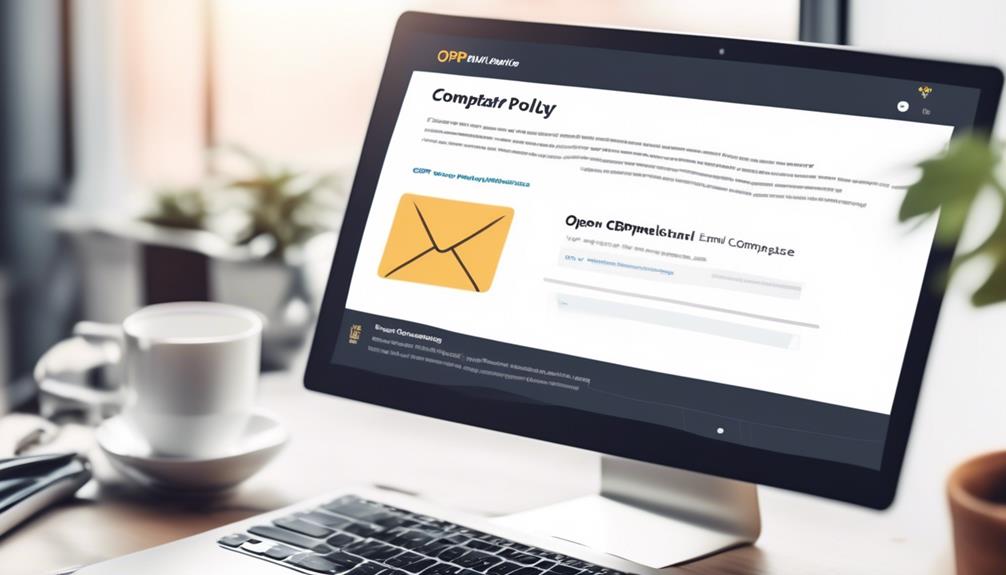
Chances are, you’re aware of the essential aspects to consider to make sure your email marketing strategies comply with GDPR standards. It goes beyond mere adherence; it’s about valuing the privacy and rights of your subscribers.
We all want to make sure we're doing things the right way, and in this fast-paced digital landscape, it's crucial to stay on top of best practices. Trust me, you don't want to miss out on these essential tips that could make or break your email campaigns.
Key Takeaways
- Obtain explicit and freely given consent from individuals for email marketing.
- Implement clear and unambiguous consent language and provide granular consent options.
- Regularly review and update security measures to ensure the protection of personal data.
- Respect subscriber preferences and honor opt-out requests promptly.
Key Principles of GDPR Compliance
Implementing the key principles of GDPR compliance ensures that our email campaigns prioritize transparency, data minimization, and security. Under the GDPR, consent for email marketing must be freely given, specific, informed, and obtained through affirmative actions. This means that individuals must actively opt in to receive marketing emails, and they should be fully aware of how their data will be used.
Transparency is crucial, requiring us to inform subscribers about the processing of their personal data for email marketing, including its use and storage. Data minimization is another vital principle, emphasizing the collection of only necessary data for marketing purposes.
When it comes to security, GDPR compliance necessitates implementing appropriate measures to protect the personal data of individuals. Additionally, accountability requires us to maintain records of data processing activities for email marketing.
It's important to remember that under GDPR, subscribers have the right to access, rectify, delete, object to, or restrict the processing of their personal data in email marketing. Adhering to these principles not only ensures compliance but also demonstrates our commitment to data protection and privacy.
Best Practices for Data Privacy

Building on the key principles of GDPR compliance, our approach to data privacy in email campaigns is anchored in ensuring clear and genuine consent while offering granular options for subscriber preferences.
When it comes to best practices for data privacy, we prioritize the following measures:
- Clear and Unambiguous Consent Language: We use language that's easily understandable and free from legal jargon when seeking consent from our subscribers. This ensures that they fully comprehend what they're agreeing to.
- Granular Consent Options: Our subscribers have the ability to select the specific types of emails they wish to receive. By providing granular consent options, we respect their preferences and promote a more personalized experience.
- Double Opt-In Confirmation Process: Implementing a double opt-in confirmation process helps us verify the authenticity of subscriber consent. This extra step ensures that the consent provided is genuine and reduces the risk of unintended opt-ins.
- Regular Security Measures Review: We regularly review and update our data protection measures to safeguard the personal data of our subscribers. This proactive approach aligns with GDPR regulations and demonstrates our commitment to maintaining GDPR-compliant email marketing practices.
Transparency and Accountability
To ensure compliance with GDPR regulations, we prioritize clear and concise communication regarding the use and storage of personal data in our email campaigns, maintaining transparency and accountability throughout our practices.
Transparency and accountability are key principles of GDPR, requiring the data controller to obtain explicit consent from individuals for the processing of personal data. Individuals have the right to know how their data is being used, and it's our responsibility to provide this information in a clear and understandable manner.
Additionally, we must respect data subject rights, including the rights to access, rectify, delete, object to, or restrict the processing of their personal data in our email marketing activities.
As part of our commitment to transparency and accountability, we keep detailed records of data processing activities and regularly review and update our security measures to safeguard personal data.
Upholding transparency and accountability in email campaigns not only ensures compliance with GDPR but also fosters trust and confidence among our subscribers regarding the handling of their personal information.
Opt-outs and Data Erasure Management

Prioritizing clear communication and robust data management processes is crucial for complying with GDPR regulations regarding opt-outs and data erasure in email campaigns. When managing opt-outs and data erasure, it's essential to adhere to GDPR guidelines and ensure the proper handling of personal data.
Here are some key considerations:
- Honor Opt-Out Requests: Respect individuals' rights by promptly processing and honoring opt-out requests. This involves providing a clear and accessible unsubscribe link in email communications.
- Implement Data Erasure Procedures: Develop and implement robust data erasure management processes to promptly delete personal data upon request. Regularly review and update these procedures to ensure compliance with GDPR requirements.
- Respect Consent: Ensure that individuals have given clear consent to receive marketing communications. Additionally, provide them with straightforward methods to manage their data preferences.
- Compliance with Right to Be Forgotten: As data controllers, it's crucial to respect individuals' right to be forgotten by promptly and effectively handling data erasure requests.
Role of Data Processors and Controllers
In understanding the GDPR compliance requirements, it is vital to recognize the distinct responsibilities of data processors and controllers. Data controllers determine the purposes and means of processing personal data, whereas data processors act on behalf of controllers, following documented instructions. Both entities are accountable for maintaining records of processing activities and implementing security measures to protect personal data. The table below provides a clear comparison of the responsibilities of data processors and controllers under GDPR.
| Responsibilities | Data Controllers | Data Processors |
|---|---|---|
| Compliance with GDPR | Responsible for ensuring processing activities comply with GDPR. | Must only act on documented instructions from the controller. |
| Data Protection | Accountable for implementing appropriate technical and organizational measures. | Required to assist controllers in meeting their obligations. |
| Record-Keeping | Responsible for maintaining records of processing activities. | Also required to maintain records of processing activities. |
| Cooperation | Essential for ensuring GDPR compliance and protecting individuals' rights regarding their personal data. | Essential for ensuring GDPR compliance and protecting individuals' rights regarding their personal data. |
Understanding the distinct roles and responsibilities of data processors and controllers is crucial for achieving GDPR compliance in email marketing and data collection activities. By clearly defining these roles, organizations can ensure that consent and processing activities align with GDPR requirements, ultimately enhancing data protection and compliance.
Frequently Asked Questions
How Do I Make My Email GDPR Compliant?
We make our email GDPR compliant by:
- Obtaining proper consent from recipients
- Ensuring transparent data collection
- Providing an easy opt-out option
We also:
- Regularly update our privacy policy
- Securely store data
- Only collect necessary information
Lastly:
- We stay informed about GDPR regulations
- Adjust our practices accordingly
These steps ensure that our email campaigns are compliant, build trust with our audience, and protect their privacy.
What Practice Should an Email Campaign Follow to Comply With Gdpr?
We should obtain explicit consent from individuals before collecting and processing their personal data.
We should provide clear information about data use and storage.
We should implement a double opt-in confirmation process.
We should regularly review and update security measures.
We should integrate privacy considerations into every stage of the email marketing process.
This ensures GDPR compliance and respects subscribers' rights to their personal data.
What Are the 7 GDPR Requirements?
We understand the 7 GDPR requirements as follows:
- Consent should be freely given, specific, informed, and obtained through affirmative actions.
- Transparency and accountability are emphasized.
- The right to be forgotten allows individuals to request data deletion.
- Businesses must maintain records and implement security measures.
- GDPR includes principles like lawfulness, fairness, and transparency, purpose limitation, data minimization, accuracy, storage limitation, integrity, confidentiality, and accountability.
These requirements form the foundation for GDPR compliance.
What Are the GDPR Rules for Sending Emails?
We need to ensure GDPR compliance when sending emails. Consent must be explicit and informed, with clear communication on data use and security measures implemented.
Individuals have the right to request data deletion, and best practices include clear consent language and a double opt-in process.
Non-compliance can lead to severe consequences.
How Can Email Marketers Ensure GDPR Compliance in Their Campaigns?
When it comes to email marketing, ensuring GDPR compliance is crucial. Some key GDPR compliance tips include obtaining explicit consent from subscribers, providing easy opt-out options, and securing data through encryption and secure storage. Email marketers must also regularly review and update their privacy policies to stay compliant.
Conclusion
In conclusion, GDPR compliance is essential for successful email campaigns. By obtaining explicit consent, informing subscribers about data use, and implementing strong security measures, we can build trust and credibility with our audience.
For example, a company saw a 20% increase in email open rates after implementing GDPR-compliant practices, showing that respecting data privacy rights can lead to improved engagement and results.
Natali – Editor in Chief (Strategy and Mastery, AI Expert) Natali, our Editor in Chief, is the driving force behind our content’s strategic direction. With a keen eye for detail and a deep understanding of market trends, Natali ensures that our content is top-notch and strategically aligned with our client’s goals. Her expertise in AI helps to seamlessly integrate advanced technology into our marketing strategies, pushing the boundaries of conventional marketing.
GDPR Email Marketing
GDPR Email Marketing: Consent Examples Guide
Uncover practical examples and guidelines for GDPR consent in email marketing, ensuring transparent and unambiguous subscriber requests. Curious to see how it's done?
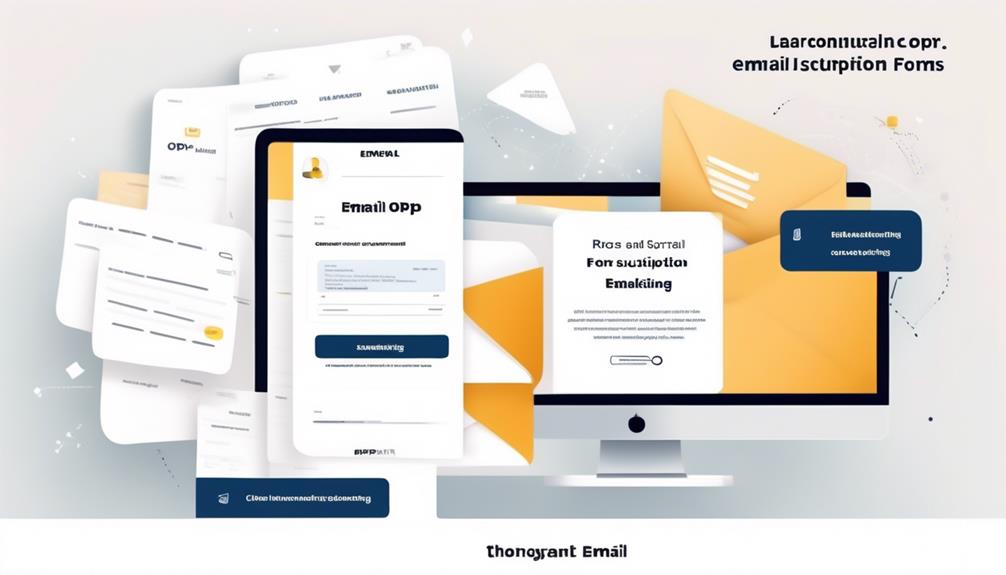
All of us have found ourselves in circumstances where we get an unexpected email, leaving us puzzled about how our contact details were acquired to begin with. It feels similar to discovering a promotional flyer for a novel eatery in your mailbox, despite never showing any inclination towards eating out.
As email marketers, we understand the importance of gaining consent from our subscribers before bombarding them with promotional content. However, navigating the intricacies of GDPR compliance in email marketing can be a daunting task.
How can we ensure that our consent requests are transparent and unambiguous? Let's explore some practical examples and guidelines to steer us in the right direction.
Key Takeaways
- Use clear and straightforward language in consent forms to build credibility and trust with the audience.
- Avoid pre-ticked checkboxes and ensure that users actively select unticked checkboxes to give consent.
- Emphasize the separation of consent and legal policies to maintain compliance with regulations.
- Use clear and easily understandable language in consent terms, avoiding ambiguity and using clear affirmative phrases.
Transparent Consent Requests
Transparent consent requests are an integral part of GDPR compliance and involve using clear, straightforward language to explain the purpose of consent and how the data will be used. When obtaining consent for email marketing or any data processing activities, it's crucial to ensure that the language used in consent forms is easily understandable.
Clearly naming your organization and disclosing any third parties involved is essential. This transparency instills trust and demonstrates respect for the user's data privacy. Avoiding complex phrasing and being transparent about the purpose of data collection and usage are key aspects of transparent consent requests.
It's important to clearly explain why the data is needed and what'll be done with it, ensuring users have a clear understanding before providing consent. By doing so, organizations not only adhere to GDPR requirements but also build credibility and trust with their audience.
Ultimately, transparent consent requests play a pivotal role in fostering positive relationships with users and demonstrating a commitment to ethical and lawful data processing practices.
Avoid Pre-Ticked Checkboxes
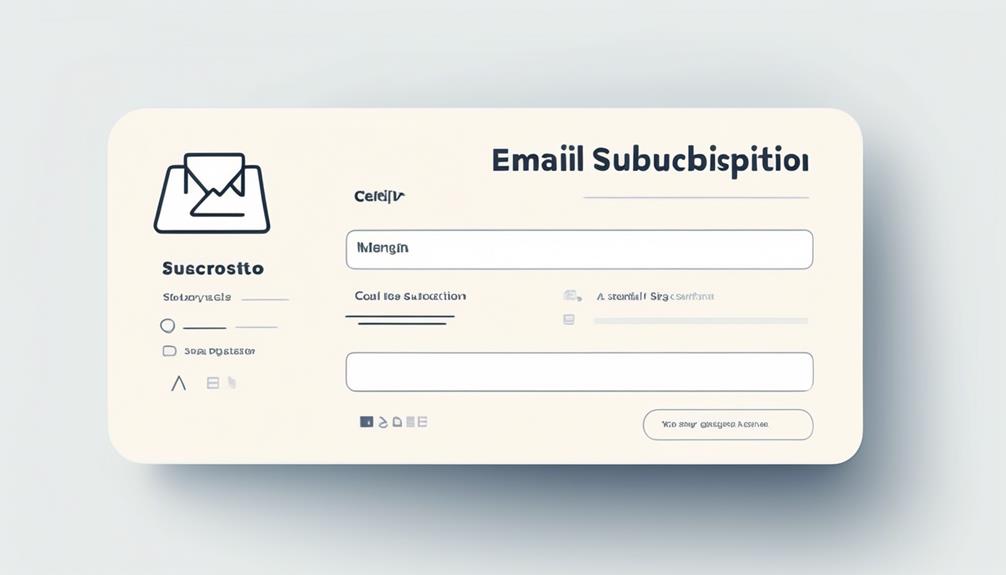
We must ensure that our consent forms don't use pre-ticked checkboxes to comply with GDPR requirements. Using pre-ticked checkboxes isn't allowed under GDPR consent requirements, as consent must be freely given.
To ensure compliance and transparency, here are three key considerations for GDPR consent forms:
- Active Opt-In: Users should be required to actively select unticked checkboxes to give consent. This ensures that consent is freely given and unambiguous, meeting the lawful basis for processing under GDPR.
- Avoid Implied Consent: It's important to avoid using pre-ticked checkboxes, implied consent, or default consent methods. Users must take a positive action to provide clear and unambiguous consent.
- Right to Withdraw Consent: Consent examples should clearly convey to users their right to withdraw their consent at any time. Providing clear instructions on how to withdraw consent reinforces transparency and empowers users to manage their consent preferences.
Separate Consent and Legal Policies
When providing examples and guidance for GDPR email marketing consent, it's crucial to emphasize the importance of separate consent and legal policies.
This involves ensuring clear consent terms, using unambiguous language, and maintaining compliance with regulations.
Clear Consent Terms
To ensure clarity and transparency, it's essential to separate consent requests from legal terms and conditions in email marketing communications. When crafting clear consent terms, it's important to use language that's easily understandable and avoids ambiguity. To achieve this, consider using clear affirmative phrases that leave no room for misinterpretation.
Additionally, ensure that your consent forms are straightforward and prominently displayed, with no pre-ticked checkboxes. Furthermore, provide easy access to your privacy policies and clearly outline the process for users to withdraw consent if they choose to do so.
Unambiguous Language Use
As we move on to 'Unambiguous Language Use', it's crucial to distinctly separate consent requests from legal terms and conditions in email marketing communications.
To ensure GDPR compliance, it's essential to use clear and unambiguous language when seeking consent from individuals. When crafting consent requests, it's important to avoid combining them with other matters, such as terms of service or privacy policies. By keeping consent requests separate from legal jargon, recipients can better understand the nature of the consent being sought.
This approach also aligns with GDPR's requirement for specific and informed consent for separate things. Therefore, in our processing operations, we must be diligent in using unambiguous language to clearly present consent requests without intertwining them with legal policies.
This not only demonstrates our commitment to GDPR compliance but also enhances transparency and trust in our email marketing practices.
Compliance With Regulations
Compliance with GDPR regulations requires clear separation of consent requests from legal terms and conditions in email marketing communications. To ensure that your email marketing efforts are GDPR compliant, the following steps should be taken:
- Separate Consent Requests: Consent must be clearly distinguishable from legal policies to ensure compliance with GDPR.
- Enable Right to Withdraw: Users should have the right to withdraw their consent at any time, as per GDPR requirements.
- Proof of Consent: Maintain records to demonstrate that valid consent has been obtained, including details of what the individual has consented to and when and how this consent was obtained.
Granular Consent Options
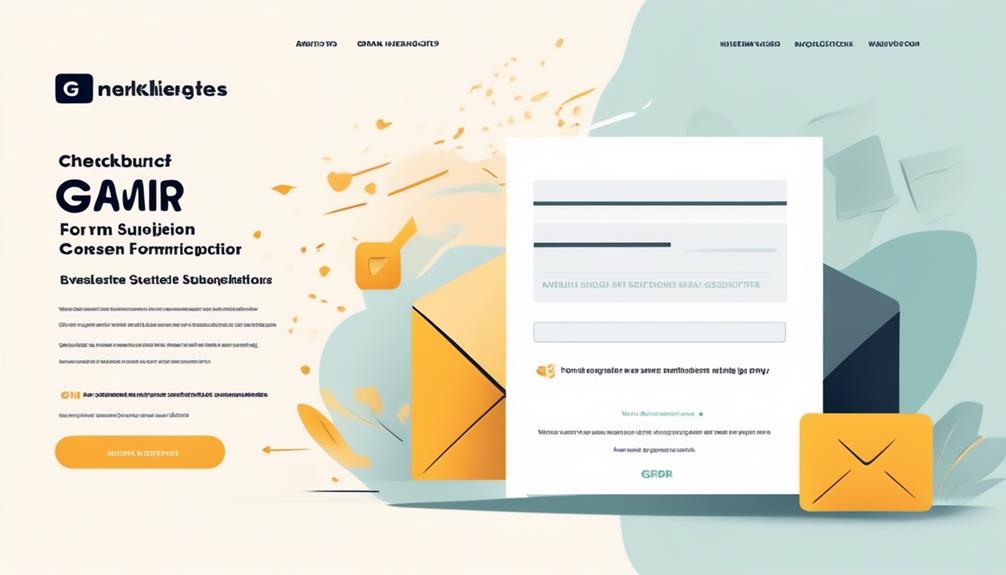
Granular consent options in email marketing allow individuals to provide specific consent for different types of data processing activities. This empowers them to make informed decisions about how their data is utilized.
This approach provides users with the ability to choose consent preferences for various marketing communications separately, including email, SMS, or postal communication. By offering clear and detailed consent choices, organizations ensure transparency and control over individuals' personal data, crucial for GDPR compliance.
With granular consent options, users can opt-in or opt-out of specific types of data usage, aligning with the GDPR's emphasis on empowering individuals to exercise control over their personal data.
This level of control not only benefits users but also helps organizations build trust and demonstrate their commitment to data privacy. Granular consent options are an essential aspect of GDPR compliance, as they enable organizations to respect users' preferences and provide them with meaningful choices regarding the processing of their personal data.
Easy Withdrawal of Consent

Ensuring individuals can effortlessly revoke their consent for data processing is a fundamental tenet of GDPR compliance and essential for maintaining trust and transparency in email marketing practices. GDPR requires that individuals have the right to withdraw their consent at any time, and as such, email marketers must facilitate easy withdrawal of consent.
Here are key strategies to achieve this:
- Separate Consent: Obtain separate consent for different types of processing activities, ensuring that individuals can revoke consent for specific purposes without affecting other consents.
- Double Opt-in: Implement a double opt-in process, where individuals confirm their consent twice before being added to a mailing list. This not only ensures explicit consent but also provides a clear path for withdrawal.
- Unsubscribe Link: Include a prominent and easily accessible unsubscribe link in all marketing emails. This allows individuals to withdraw their consent effortlessly, without encountering barriers or delays.
Recordkeeping for Consent
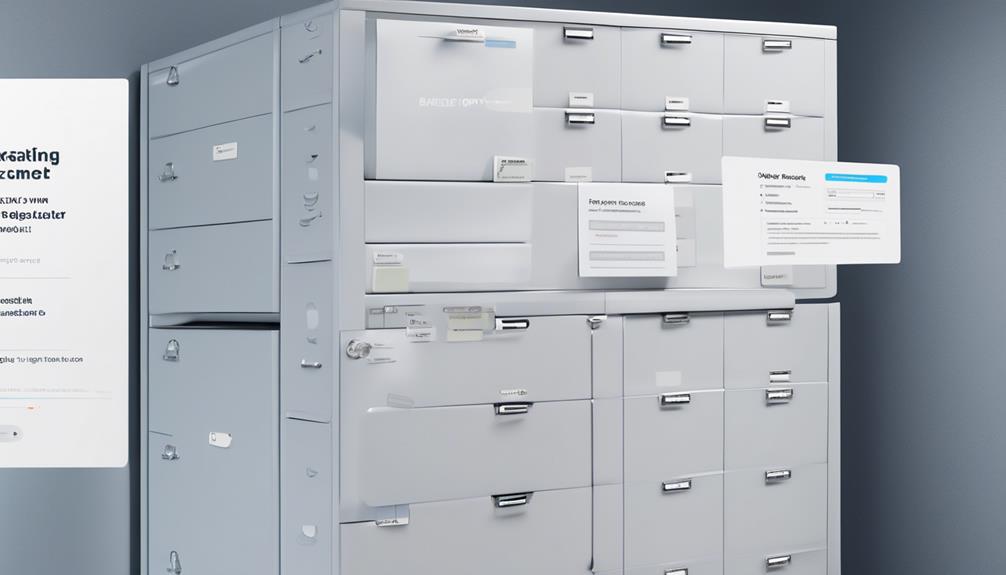
Maintaining trust and transparency in email marketing practices, we must adhere to GDPR's requirement for recordkeeping of consent choices, including the method and timing of individuals' consent, as we move into the subtopic of 'Recordkeeping for Consent'.
Recordkeeping for consent is a crucial aspect of GDPR compliance in email marketing. It involves maintaining detailed records of how and when individuals provided consent, what they were informed about at the time of consent, and the specific method used for obtaining their consent, such as through an opt-in form or another explicit action.
These records are essential for demonstrating compliance with GDPR requirements and for providing evidence in case of any disputes or regulatory inquiries. Effective recordkeeping ensures that organizations can prove they obtained valid consent from individuals and that they've respected individuals' choices regarding their personal data.
Additionally, maintaining accurate consent records enables organizations to promptly honor requests for withdrawal of consent, as required by GDPR.
Information to Record for Consent
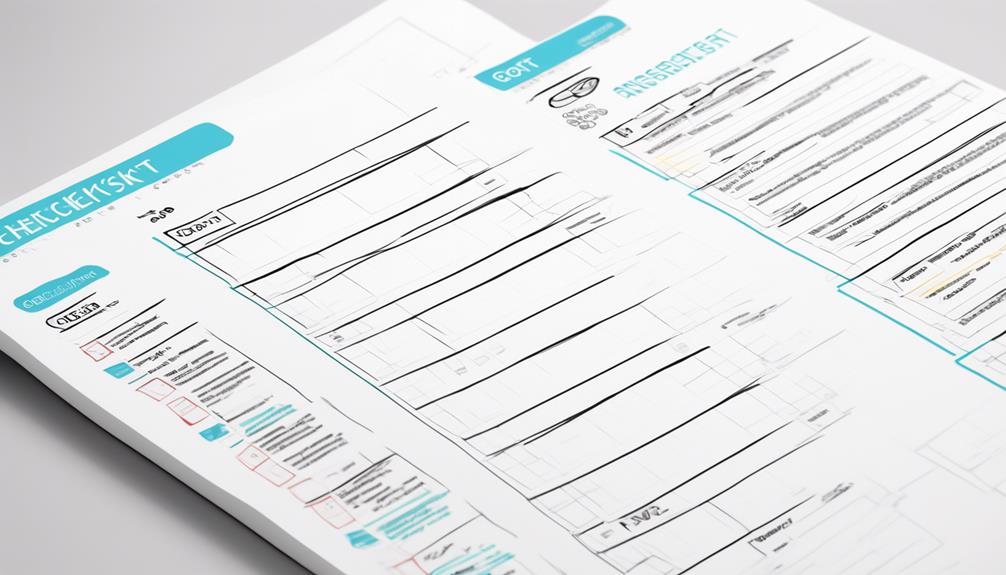
To ensure comprehensive compliance with GDPR requirements, it's crucial to accurately record specific details when obtaining consent for email marketing purposes. When recording consent for GDPR email marketing, the following information should be carefully documented:
- Date and Time: Record the exact date and time when consent was given, as this is crucial for demonstrating compliance with GDPR requirements and for potential future audits.
- Method of Consent: Document the method through which consent was obtained, whether it was through an online form, verbal agreement, or any other means. This ensures transparency and accountability in the consent process.
- Purpose and Use of Data: Specify the purpose for which consent is given and how the data will be used. This includes providing clear information on the intended use of the data and the specific marketing activities it relates to.
It's important to note that relying on pre-ticked checkboxes or implied consent isn't considered valid under GDPR. Seek legal advice to ensure that the information recorded for consent aligns with the legal requirements and best practices for GDPR email marketing compliance.
User Consent Management
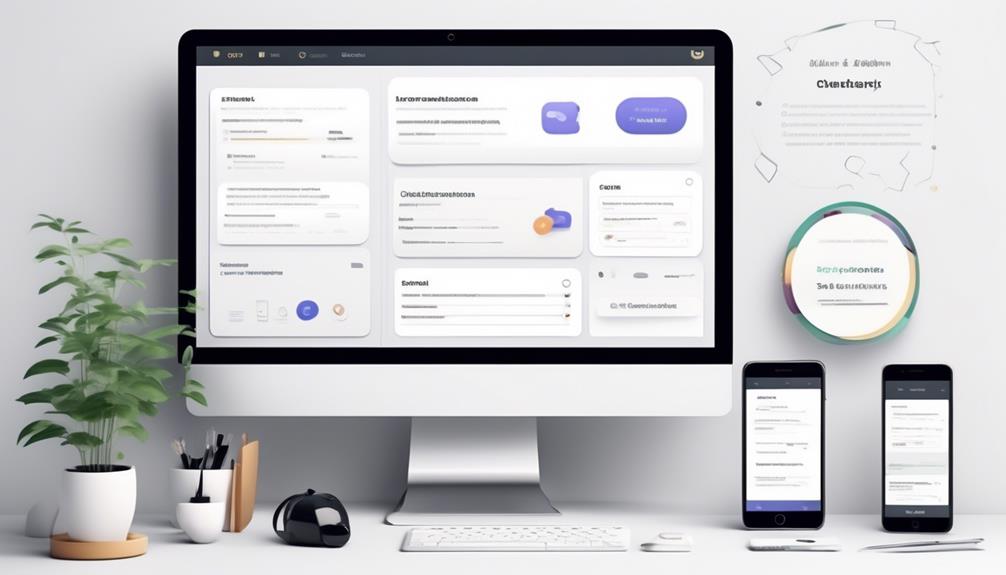
Now, let's address the crucial aspects of user consent management.
We'll explore the optimal opt-in consent process, the importance of providing consent withdrawal options, and the necessity of data retention compliance.
These points are fundamental for ensuring that our email marketing practices align with GDPR regulations and respect user privacy.
Opt-In Consent Process
Implementing an effective opt-in consent process is crucial for ensuring compliance with GDPR regulations on user consent management. To achieve this, we need to:
- Obtain specific, informed, and unambiguous consent from individuals, allowing them the right to easily withdraw consent. This ensures that individuals are fully aware of the privacy implications of their consent.
- Consider implementing a double opt-in consent request for mailing lists, although it isn't explicitly required by GDPR, to ensure a robust verification process.
- Provide users with a way to manage their consent choices, including the ability to change their minds at any time, as required by the General Data Protection Regulation.
Consent Withdrawal Options
Ensuring that users have straightforward and accessible options to withdraw their consent is a fundamental aspect of GDPR compliance and user consent management. Providing clear and easy-to-use consent withdrawal options is essential for respecting users' rights under GDPR. Users must have the ability to change their consent preferences at any time, as the basis for processing data relies on their freely given consent. To facilitate this, websites should offer consent preference centers and Data Subject Access Request (DSAR) forms that are easily accessible. Below is a table outlining some common consent withdrawal options:
| Consent Withdrawal Options | Description |
|---|---|
| Preference Center | Online platform for users to manage their consent choices |
| DSAR Form | Form for users to request access to and control over their personal data |
| Soft Opt-In | Allowing users to opt out of consent easily, even after initially giving consent |
Data Retention Compliance
Data retention compliance is a critical aspect of user consent management under GDPR, requiring organizations to carefully oversee and document user consent throughout the data lifecycle. To ensure compliance, organizations should:
- Record and store consent data, including details of when, how, and what users consented to, as part of their privacy policy.
- Enable users to easily withdraw their consent, in accordance with GDPR requirements, by providing clear and accessible withdrawal options.
- Consider implementing a double opt-in process for obtaining and managing user consent for mailing lists, and explore alternative methods for obtaining unambiguous consent, such as using pop-ups, based on applicable laws and proper notice to users.
Effective data retention compliance is essential for organizations to align their practices with GDPR and ensure the lawful processing of personal data.
GDPR Compliant Opt-in Examples
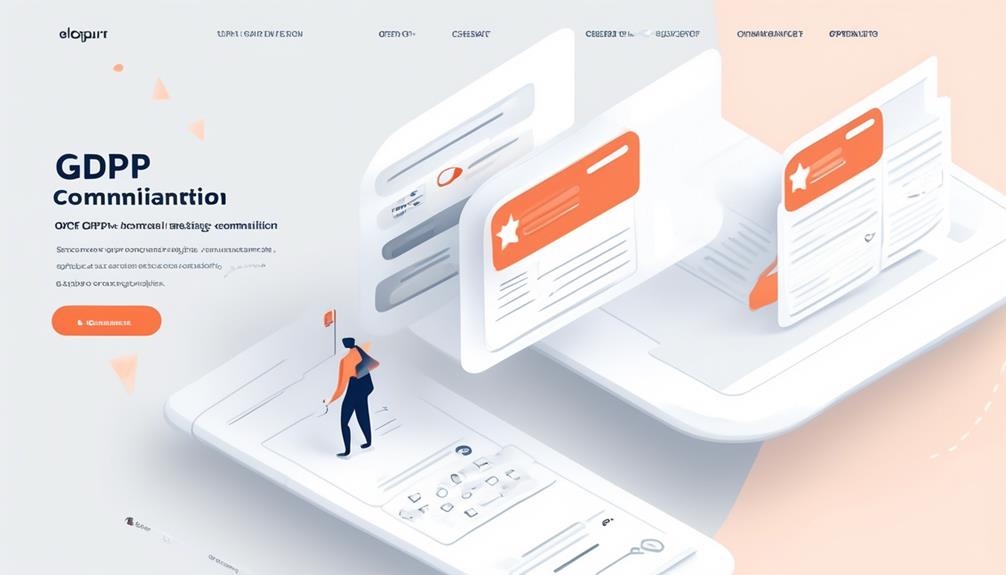
When seeking GDPR-compliant opt-in examples for email marketing, it's crucial to ensure that consent is specific, informed, and unambiguous, in line with GDPR regulations.
One effective example of GDPR-compliant opt-in consent involves using clear, unambiguous language to explain to users that by providing their email address, they're consenting to receive marketing communications. This explanation should also outline how their personal data will be used, emphasizing transparency.
Additionally, it's important to avoid pre-ticked checkboxes or any form of implied consent, as these practices don't align with GDPR requirements.
Implementing a double opt-in process for mailing lists can also serve as a best practice, although it isn't explicitly mandated by GDPR. This process involves sending a confirmation email to the user after they initially opt-in, requiring them to take a further action to confirm their subscription.
It's also crucial to provide users with a simple way to withdraw their consent, as per GDPR guidelines, ensuring that they can easily opt out of receiving marketing communications.
Opt-in Form Examples
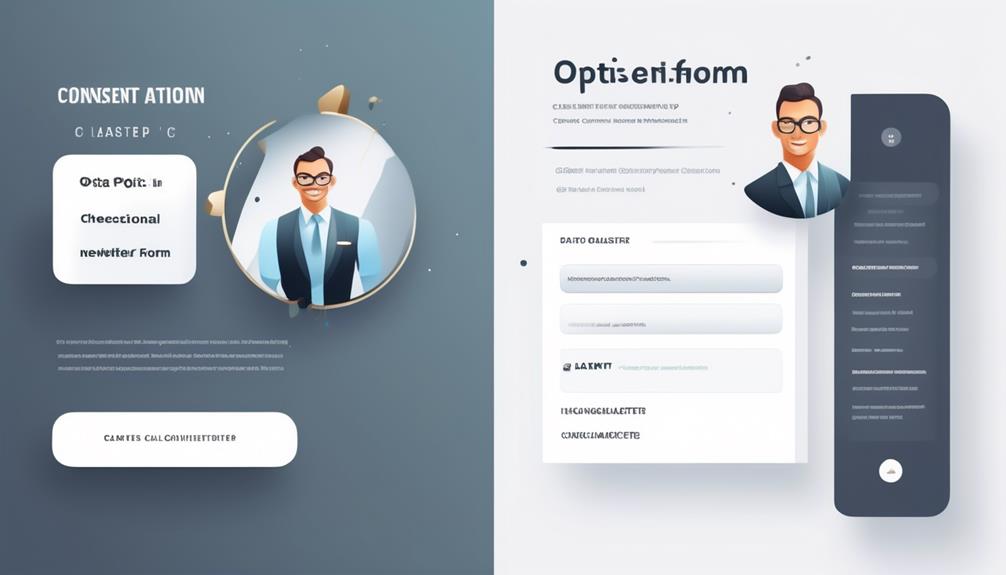
To enhance user understanding and compliance with GDPR regulations, opt-in form examples should utilize clear and straightforward language to request consent. When creating opt-in forms for email marketing, it's crucial to follow GDPR guidelines and best practices. Here are three key elements to consider when designing opt-in forms:
- Clear and Unambiguous Language: Opt-in forms should use language that's easy to understand and free from ambiguity. Clearly state what the user is consenting to, such as receiving marketing emails or sharing their data with third parties.
- Unticked Checkboxes: Avoid using pre-ticked checkboxes, implied consent, or default consent. Instead, present users with unticked checkboxes that they must actively select to give consent. This ensures that consent is explicit and affirmative.
- Double Opt-In Consent: Consider implementing a double opt-in process for mailing lists. After users fill out the online consent form, they should be required to confirm their email address to verify their consent.
Effective Permission Reminders
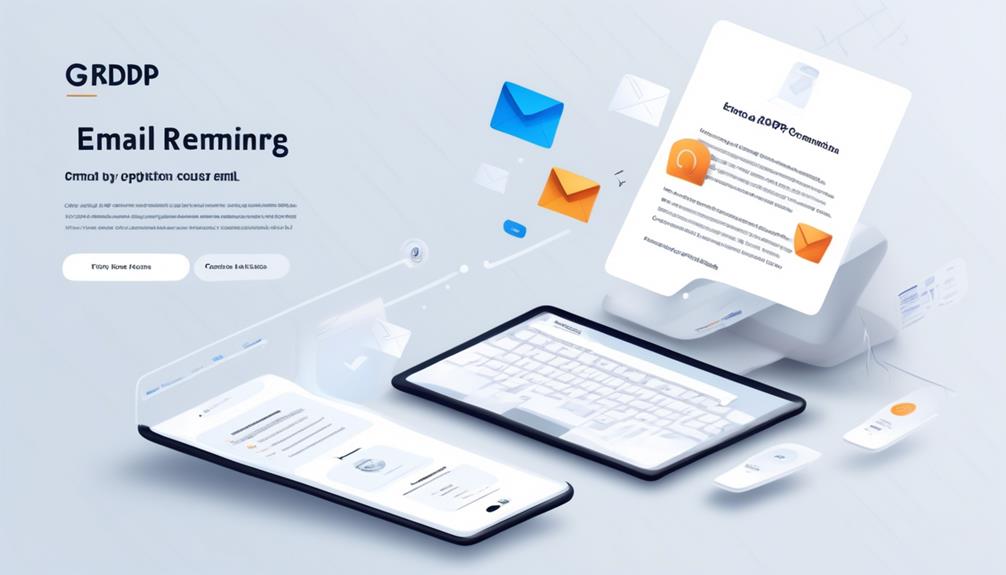
As we shift our focus to 'Effective Permission Reminders', it's essential to maintain clarity and transparency in our communication with users regarding their consent for email marketing. Effective permission reminders should clearly explain why the data is being collected and how it will be used to maintain transparency with users. Utilize clear and specific language to request consent, avoiding pre-ticked checkboxes or vague statements to ensure understanding and meet GDPR requirements. Consider implementing double opt-in consent for mailing lists as a best practice, even though it is not explicitly required by GDPR, to verify and record user consent. Provide users with easy ways to manage their consent choices, including the ability to withdraw consent and access a consent preference center on the website, as required by GDPR. Below is a table summarizing the key points for creating effective permission reminders in GDPR email marketing.
| Key Points | Description |
|---|---|
| Clearly Explain Data Collection and Use | Explain why the data is being collected and how it will be used to maintain transparency with users. |
| Utilize Clear and Specific Language for Consent | Avoid pre-ticked checkboxes or vague statements to ensure understanding and meet GDPR requirements. |
| Provide Easy Consent Management Options | Offer users easy ways to manage their consent choices, including the ability to withdraw consent and access a consent preference center on the website. |
GDPR Compliant Email Marketing Examples
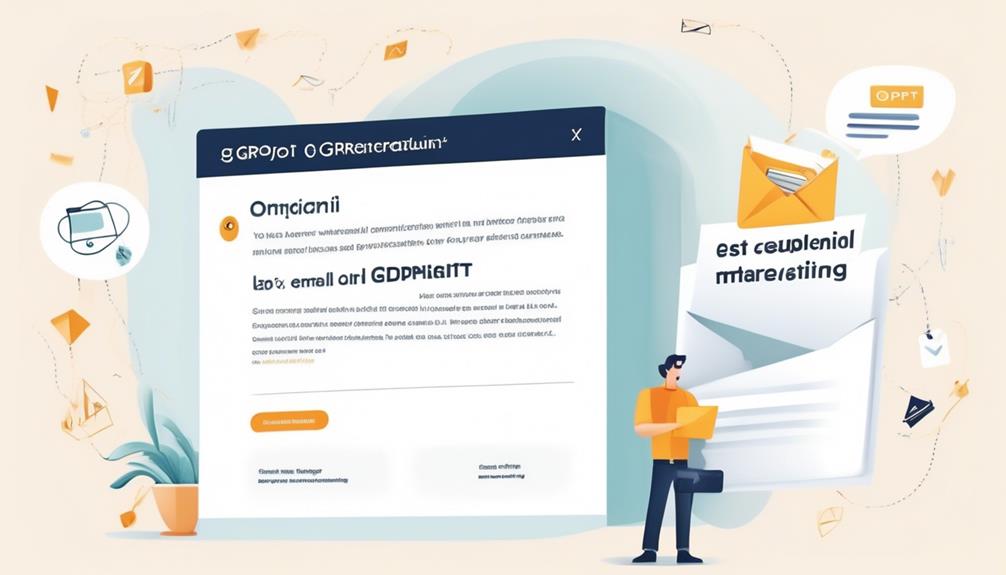
In our pursuit of GDPR compliance in email marketing, we exemplify best practices through clear and explicit consent procedures that prioritize user understanding and choice.
When implementing GDPR compliant email marketing, we ensure that consent is freely given, specific, informed, and unambiguous. We avoid non-compliant checkbox usage, such as pre-ticked checkboxes and implied consent, as they violate GDPR.
Additionally, we consider implementing a double opt-in consent request for mailing lists, although it's not explicitly required by GDPR. We also provide alternative methods for unambiguous consent, such as pop-ups asking users to enter their email address with clear phrases and labeled buttons.
Furthermore, we prioritize making it easy for users to withdraw consent, and we maintain a record of consent choices, including when, how, and what users consented to, in accordance with GDPR requirements.
Frequently Asked Questions
How Do I Write a GDPR Consent Form?
We write GDPR consent forms by ensuring they're freely given, specific, informed, and unambiguous, as required by GDPR.
We avoid pre-ticked checkboxes and use clear, easy-to-understand language in consent requests.
Consider implementing a double opt-in consent request for mailing lists and provide alternative methods for obtaining unambiguous consent.
Allow users to easily manage their consent choices and provide a way for them to withdraw consent, as per GDPR requirements.
How Do I Comply With GDPR Email Marketing?
We comply with GDPR email marketing by obtaining freely given, specific, informed, and unambiguous consent. We avoid non-compliant checkbox usage, implement double opt-in consent when possible, and utilize alternative methods for unambiguous consent, such as clear pop-ups and labeled buttons.
We also provide users with the ability to manage their consent choices and easily withdraw consent. These practices ensure compliance with GDPR requirements for email marketing.
What Is GDPR Compliant Consent Wording?
We ensure GDPR compliant consent by using clear, specific, and unambiguous language in our consent requests. We identify ourselves and disclose any third parties involved.
To avoid non-compliant checkbox usage, we require users to actively select unticked checkboxes for consent. For mailing lists, we implement double opt-in consent requests, where users confirm their email address.
Alternative methods like pop-ups with clear phrases and labeled buttons also comply with GDPR.
What Is an Example of Consent Email?
Sure!
An example of a consent email would be one that clearly outlines what data is being collected and how it will be used. It provides an option to easily withdraw consent and uses explicit language for permission.
It's important to avoid pre-ticked checkboxes or implied consent. Double opt-in requests are a best practice. Using clear phrases and labeled buttons can also help ensure unambiguous consent.
Can You Provide Examples of GDPR-Compliant Email Marketing Consent?
Yes, I can provide examples of GDPR-compliant email marketing consent. One example is clearly outlining how the subscriber’s data will be used and obtaining explicit gdpr consent for email marketing. Another example is providing a clear and easy opt-in process for subscribers to give their consent for email marketing under GDPR regulations.
Conclusion
In conclusion, ensuring GDPR compliance in email marketing is crucial for protecting the privacy and rights of subscribers. By implementing transparent consent requests, granular options, and easy withdrawal processes, email service providers can help users maintain compliance.
Let's strive to avoid pre-ticked checkboxes and provide effective permission reminders to create a harmonious and respectful email marketing environment.
Together, we can navigate GDPR requirements and build trust with our subscribers, like a well-choreographed dance.
Natali – Editor in Chief (Strategy and Mastery, AI Expert) Natali, our Editor in Chief, is the driving force behind our content’s strategic direction. With a keen eye for detail and a deep understanding of market trends, Natali ensures that our content is top-notch and strategically aligned with our client’s goals. Her expertise in AI helps to seamlessly integrate advanced technology into our marketing strategies, pushing the boundaries of conventional marketing.
-

 Email Automation3 weeks ago
Email Automation3 weeks agoAutomated Email Marketing 101: A Beginner's Tutorial
-

 Email Warmup1 month ago
Email Warmup1 month agoWarm Follow-Up Email
-

 Email Design Hub1 month ago
Email Design Hub1 month ago3 Essential Tools for Email Marketing Design Success
-

 Email Marketing3 weeks ago
Email Marketing3 weeks agoWhat Is Email Marketing Advantages and Disadvantages
-

 Email Marketing4 weeks ago
Email Marketing4 weeks agoWhy Email Marketing Is Effective
-

 Email Template3 weeks ago
Email Template3 weeks agoCrafting the Perfect Book Club Invitation Email Template
-

 Search Engine Optimization3 weeks ago
Search Engine Optimization3 weeks agoSEO Checklist: Enhance Your Site’s Performance
-

 Email Marketing3 weeks ago
Email Marketing3 weeks agoDoes Email Marketing Work in 2024
















